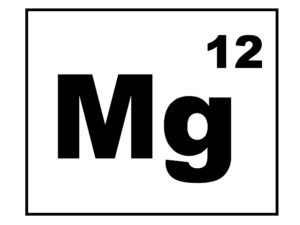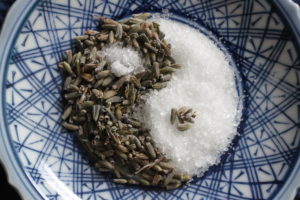by Sara Allen, AP, Dipl. OM
Want a better night’s sleep? Less pain? The end to muscle cramps?
For at least 50% of my patients, a good night’s sleep is a problem. For another 50%, pain is a main issue. Another 10% have neuropathy or leg cramps. They all have one thing in common: Magnesium.
 Magnesium has 12 protons, and its 2 outer electrons means that it ionically bonds easily with other atoms. These combinations with other elements makes it a diverse and wonderful element. It is the center element in chlorophyl for photosynthesis. It is a major component of our bones and multiple enzymes in the human body. It helps balance calcium in the body, aids potassium absorption, and helps regulate neurotransmitters.
Magnesium has 12 protons, and its 2 outer electrons means that it ionically bonds easily with other atoms. These combinations with other elements makes it a diverse and wonderful element. It is the center element in chlorophyl for photosynthesis. It is a major component of our bones and multiple enzymes in the human body. It helps balance calcium in the body, aids potassium absorption, and helps regulate neurotransmitters.
Many people have a Magnesium deficiency; some estimates say that 50-75% of adults do not have enough Magnesium in their bodies. Magnesium is found in foods like dark, leafy greens, legumes and other vegetables, unprocessed grains, meats, seeds and nuts, and chocolate. Consuming the following items actually interferes with Magnesium balance in the body: carbonated beverages, refined sugars, diuretic medications or excess tea and coffee, and imbalanced supplements of calcium and zinc; in addition, stress is a major factor prohibiting the proper absorption and use of magnesium, along with improper gut flora from the overuse of antibiotics.
What benefits does Magnesium provide?
A good night’s sleep may begin with Magnesium. It aids in the production of GABA, the calming, go-to-sleep neurotransmitter. Magnesium can help a person reach the deep, restorative sleep necessary to feel well-rested in the morning. It can also help with the “restless” feeling in the body when it’s time to sleep. It can even help with restless leg syndrome.
Recent studies have shown that Magnesium is a great analgesic, meaning that it can take away pain by blocking pain receptors in the nervous system. An analgesic most people are familiar with is Tylenol. Magnesium is also anti-inflammatory. The most common over-the-counter anti-inflammatories are NSAIDs like ibuprofen. But magnesium is a natural, non-pharmaceutical supplement which can do some of the job that more powerful drugs do.
Magnesium relieves muscle spasms by opposing the contraction-action of calcium on the muscles. Too much calcium causes the muscles to spasm tight, while magnesium causes the muscles to relax. Magnesium also dilates the blood vessels, which can increase circulation, especially to hands and feet.
The same action on bigger muscles to prevent spasms also works on a micro-level in the blood vessels. This dilation of blood vessels can help decrease neuropathy by allowing proper nourishment of nerves and tissues. Also, the anti-inflammatory effect works well on muscles and nerves as well.
 In addition to better sleep, and less pain and muscle spasms, Magnesium can also:
In addition to better sleep, and less pain and muscle spasms, Magnesium can also:
- Stabilize moods and reduce anxiety; it may also help with ADHD
- Reduce cholesterol and high blood pressure
- Improve bone mass and prevent osteoporosis
- Regulate metabolism, especially of glucose and insulin-sensitivity, which can reduce metabolic syndrome or diabetes
If all this sounds amazing, you may be asking HOW much and WHAT supplement to take?
 My favorite way of “consuming” magnesium is through EPSOM SALT foot baths. Epsom salt is made of Magnesium Sulfate, which breaks apart into readily absorbable Magnesium ions in water. The skin is not just a protective layer of the body. It is the largest organ in the body! This organ easily absorbs minerals which then get distributed throughout the body. In this way, the digestive system is bypassed for very efficient intake and distribution, especially to the legs and lower body! This is a great way to reduce leg cramps, neuropathy of the feet, and pain in the legs or low back. In addition, the WARM WATER of the foot bath dilates the blood vessels in the feet, increasing the circulation of the feet and legs, which, in turn, decreases the excess blood flow to the head. This small shift of circulation helps quiet the mind to reduce worry and anxiety before bed. Adding dried lavender or 3 or 4 drops of lavender essential oil to the foot bath and letting the feet soak for 15 to 30 minutes increases the sleep-promoting properties of the Epsom salts.
My favorite way of “consuming” magnesium is through EPSOM SALT foot baths. Epsom salt is made of Magnesium Sulfate, which breaks apart into readily absorbable Magnesium ions in water. The skin is not just a protective layer of the body. It is the largest organ in the body! This organ easily absorbs minerals which then get distributed throughout the body. In this way, the digestive system is bypassed for very efficient intake and distribution, especially to the legs and lower body! This is a great way to reduce leg cramps, neuropathy of the feet, and pain in the legs or low back. In addition, the WARM WATER of the foot bath dilates the blood vessels in the feet, increasing the circulation of the feet and legs, which, in turn, decreases the excess blood flow to the head. This small shift of circulation helps quiet the mind to reduce worry and anxiety before bed. Adding dried lavender or 3 or 4 drops of lavender essential oil to the foot bath and letting the feet soak for 15 to 30 minutes increases the sleep-promoting properties of the Epsom salts.
Magnesium dietary supplements are another wonderful way to get more magnesium in the body, especially when paired with Vitamin D3. Because good gut flora is important for proper magnesium absorption through digestion, taking a probiotic and reducing dietary refined sugars and carbohydrates will also help. One caution: in some people, large amounts of magnesium can have a laxative effect.
Lastly, your body may not be processing magnesium properly. Getting an NAET or allergy elimination acupressure treatment for minerals will help your body absorb and utilize this essential element to the fullest.
Here’s to Better Health for a Better You!

